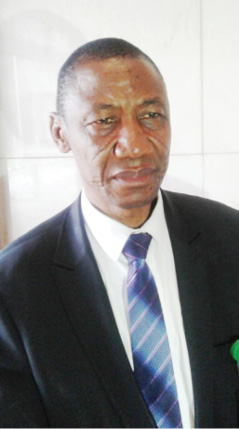80% of Investment Tribunal staff not lawyers – CEO
Isiaka Isaiah Idoko, the chairman/CEO of Investments and Securities Tribunal (IST), in this interview speaks on its jurisdiction, challenges and other issues. Excerpt: What is IST? The Investments and Securities Tribunal (IST) is an independent specialized judicial body, originally established under Section 274 of the Investments and Securities Act No. 29 of 2007. It […]

Isiaka Isaiah Idoko
Isiaka Isaiah Idoko, the chairman/CEO of Investments and Securities Tribunal (IST), in this interview speaks on its jurisdiction, challenges and other issues. Excerpt:
What is IST?
The Investments and Securities Tribunal (IST) is an independent specialized judicial body, originally established under Section 274 of the Investments and Securities Act No. 29 of 2007. It has jurisdiction, original and appellate, to interpret and adjudicate on all capital market and investments civil disputes as specified under the Investments and Securities Act No. 29 of 2007.
Section 274 of ISA 2007 states that there is established a body to be known as the Investments and Securities Tribunal to exercise the jurisdiction, powers and authority of the Tribunal Conferred on it by or under this Act.
As a special court, how are you able to fast track cases before the tribunal?
Cases before the IST are concluded within three months. This is due to the way we handle the cases. Where there is a preliminary objection, it is normally incorporated in the final written address and it would be considered at the judgment.
In what state did you meet the IST?
The current tribunal was constituted on August 1, 2017 and then inaugurated on the 19th day of September 2017. Since then, the tribunal went into action. But before the appointment, the tribunal was not functioning for about two years in the sense that there was no sitting. There was backlog of cases. All the cases were instituted since 2015, with some having gone up to judgment level. In fact we met about 54 cases on the ground. We had to start all the cases from the scratch. By law we had to start all the cases de novo because they were part heard. That was the state in which we met the tribunal.
There were some other administrative challenges. In fact the administrative challenges were two fold. Adjudication, that is backlog of cases and then issues bordering on corporate governance, that might have been responsible for the dissolution of the tribunal. There was even the issue of funding. The current members of the IST came in with the zeal to do their duty. As at today, out of the 54 cases we met, we have disposed of 30 cases. We are still trying to sort out all the other issues.
One of the things we discovered about the IST is the lack of awareness, even with lawyers. The way and manner they handle issues bordering on investment in this country.
How were you able to harmonize the working relationship with the management staff that you met?
It was not an easy thing. In a court system, the tribunal is a court, and close to about 80 per cent of them are not lawyers. There is always the misplacement of the objective of the tribunal. Because of that some staff do not even understand the nature of the work. The staff are always agitated about their allowances and some don’t even bother to work.
What is the jurisdiction of the IST?
The IST is vested with the onerous responsibility of interpreting the ISA and adjudicating on disputes and controversies in capital market transactions. The concept of IST, though novel, is not peculiar to Nigeria. In the UK, there is the Financial Services and Market Tribunal (FSMT), in India, the Securities Appellate Tribunal (SAT), and the Hong Kong Market Misconduct Tribunal (MMT) amongst others. It is however, pertinent to note that the tribunal is the first and only one of its kind in Africa.
The Tribunal combines the rule of law applicable in traditional law courts with the responsiveness, flexibility, speed and cost effectiveness associated with the specialized courts and alternative dispute resolution (ADR) systems. The tribunal has specialized knowledge of the capital market/securities and operations due to the varied technical and operational skills of its members and staff which it applies in deciding each case brought before it.
